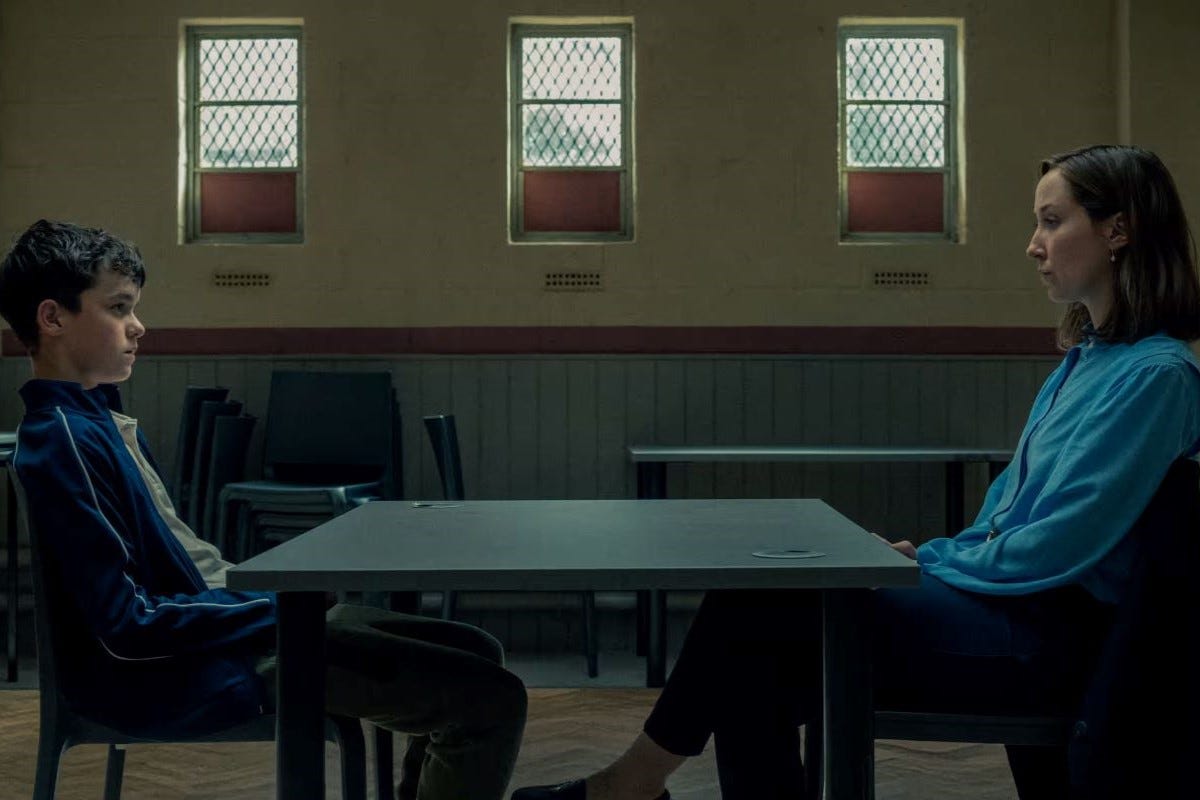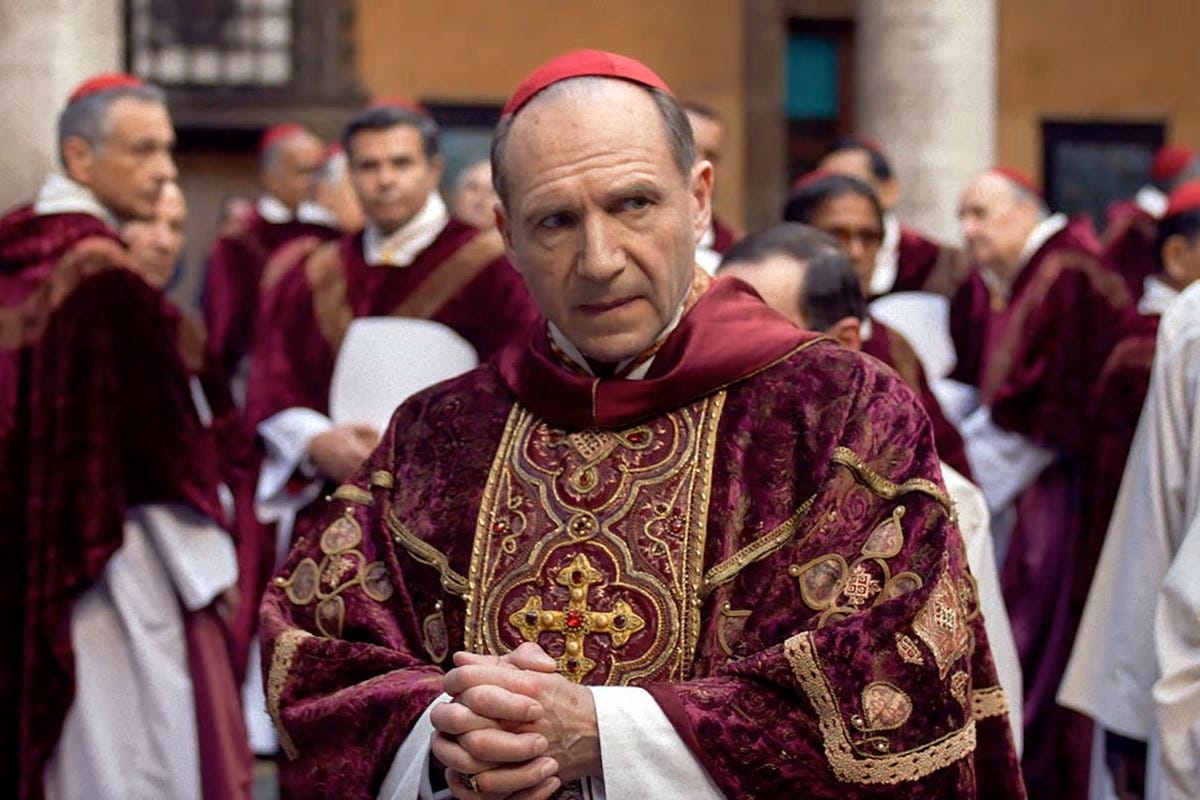Your favourite TV series was built on a bedrock of theatrical talent
And it is time the screen industry started giving something back. Plus: ten shows to see over the next three weeks, as I am off on holiday for a bit.
Hello, and welcome to The Crush Bar, a newsletter about theatre by Fergus Morgan.
This is the free Friday issue, which usually contains an interview with a theatremaker or an essay on a theatre-related topic. This week, it is a bit from me about what recent hit series and films - from Adolescence to Conclave - owe to the theatre industry.
After that, instead of your usual three recommendations, there is a list of ten shows to see over the next few weeks. That is because I am taking a break from publishing this newsletter to go on holiday and focus on some other stuff. It will be back in mid-April.
In case you missed it, here is this week’s issue of Shouts And Murmurs, which is a weekly round-up of the most interesting writing about theatre elsewhere…
You can get Shouts And Murmurs in your inbox every week - and help keep all this going - by signing up as a paid supporter of The Crush Bar for £5/month or £50/year.
I am a nightmare to watch a TV series or a film with.
It is because every time an actor I know comes on screen, or a name I know appears in the credits, I pipe up. I can’t help it. I’ll say something like: “Oh, I saw them in this great play at the Young Vic a few years ago,” or “Oh, I interviewed them not that long ago when they were doing a show at the Almeida,” or “Oh, I didn’t realise this was by that writer. I saw their early stuff at the Soho Theatre and thought it was great.”
The other night, for example, I watched Sunshine On Leith with my partner and her family. Well, they tried to watch it. I don’t know how much they caught amid my constant commentary: “Did you know this is by Stephen Greenhorn? He’s a lovely bloke. He also wrote the play Passing Places. I chatted to him for my highly acclaimed podcast series. Oh, and that’s Antonia Thomas. I interviewed her a few years ago. She is in Lovesick, too, with Johnny Flynn, who I’ve also interviewed, and Joshua McGuire, who I am chatting to next week ahead of Rhinoceros at the Almeida Theatre. I saw him in Rosencrantz And Guildenstern Are Dead with Daniel Radcliffe and David Haig, who I have also interviewed, at the Old Vic. That’s funny. Harry Potter and the Cursed Child was directed by John Tiffany, who was also the original director of Passing Places. Who’s that? Oh, that’s Kevin Guthrie. The less said about him the better.”
I know that my relentless chatter is a pain for everyone else, but it is actually one of the great joys of my job. I love being able to trace the genesis of a project, map out the connections between its creators, and understand its provenance. I find that it enriches the experience of watching it, in the same way that one might appreciate a plate of food more if you know where the ingredients came from, I guess. And, as the years tick by and the reviews and interviews steadily rack up, it happens more and more often. In fact, I would say it is rare for me to watch an episode of television or sit through a film and not spot an actor I have either interviewed or seen perform on stage, or pick out a writer whose work I have not encountered previously somehow.
Unfortunately for my family and friends, there is no end in sight to their suffering because these connections between stage and screen are everywhere, and that is because film and television continues to rely on the talent developed by the theatre.
Take Adolescence, the gripping four-part Netflix drama about a teenager accused of murder that has rightly been hailed as one of the best series of recent years. Yes, Stephen Graham is great. Yes, the single-shot camera work is captivating. What makes the show so harrowing, so heartbreaking, and so human, though, is the writing. And for that, we have Jack Thorne to thank, a man who fell in love with drama seeing shows as a youngster at Bristol Old Vic, learned his craft with plays at the Bush Theatre, the Arcola Theatre, Dundee Rep, and the Royal Court, then branched out into TV with Skins, and is now a certified national treasure, having created several hit films, series and plays, from Wonder, to His Dark Materials, to The Motive And The Cue.
Or take Rivals, Disney+’s riotous adaptation of Jilly Cooper’s raunchy Rutshire Chronicles. The writing room is packed with people that had their first stuff on stage. It is led by Laura Wade, who broke out with Posh at the Royal Court in 2010, but also includes Marek Horn, whose plays Wild Swimming, Yellowfin and Octopolis were recent hits, and Dare Aiyegbayo, who has worked with Papatango and Theatre503. And the cast is stuffed with stars who have built careers off the back of stage success: David Tennant, Alex Hassell, Bella Maclean, Aidan Turner, Katherine Parkinson, and more.
Or take Conclave, the BAFTA-winning movie about the fraught process of finding a new pope. Yes, it is based on a book by Robert Harris, but the screenplay is by Peter Straughan, who has previously worked with Newcastle’s Live Theatre, the Hampstead Theatre, Paines Plough, The National Theatre, Northern Stage, and The Royal Shakespeare Company. Stars Ralph Fiennes and John Lithgow are stage stalwarts, too.
Take ITV’s Playing Nice. Take Channel 4’s Brian and Maggie. Take HBO’s House Of The Dragon. Take the series Mr Loverman, Masters Of The Air, The Dry, Say Nothing, Sherwood, Lost Boys and Fairies, Wolf Hall, and Succession. Take the films All Of Us Strangers, Small Things Like These, The Outrun, Queer, Wicked, and The Brutalist. Of course, I am not saying all these recent series and films are entirely reliant on theatre, but at least one person that plays a key part in all of them owes their career to theatre. And that is before considering the scores of technical roles that will have been filled by people that also got their starts in theatre: directors, sound designers, lighting designers, costume designers, make-up artists, production managers and more.
I could go on and on and on and on and on. In fact, I will, because theatre’s impact on film and television extends way beyond personnel, too. Screen work is influenced by stage work thematically and conceptually, too. What are the extraordinary single-shot episodes of Adolescence, if not intricately choreographed pieces of promenade theatre? And I haven’t seen episode three yet, but people tell me it bears a lot of similarity to the kind of intimate, two-handed drama you get in theatre all the time. Who is Alex Hassell’s Rupert Campbell-Black, the upper-class heartthrob at the centre of Rivals, if not one of the boys from Posh all grown up? What is Conclave, with its conspiratorial conversations and cyphered characters if not Shakespeare set in the Vatican?
Why bother pointing all this out? Well, partly because it is interesting, partly as an apology to those forced to endure my rabbiting, but mostly because there is an inequity here that warrants addressing: most of the studios and producers involved with the projects mentioned above have done extremely well for themselves, but all the theatres that nurtured the talent they have built that success on are struggling. Netflix earned nearly $40 billion last year. Not that long ago, the Bush Theatre, the venue where Jack Thorne, writer of Netflix’s Adolescence, had his first work produced, was forced to shut during the day in a cost-cutting effort to avoid insolvency, and a similar story could be told about every theatre mentioned above. That seems wrong.
What can be done? Well, I would like to see more mechanisms to redirect some of the profits made by the screen industry back into the theatre industry. I guess this technically exists already: wealthy companies and individuals are taxed and that tax is used to provide subsidy to theatres via Arts Council England and its devolved equivalents. That subsidy is never enough, though, nor will it be. The arts will always lose out to other priorities - the NHS, defence - when it comes to public spending.
How about exploring more direct, responsible and engaged mechanisms, though? What about big studios starting funds to support theatres in running artist development schemes? What about wealthy executives ploughing money into underfunded venues? What about successful actors that have made millions out of screen careers built on the back of starts given to them on stage taking a few weeks out of their filming schedules and doing a money-spinning stint at a regional theatre?
Those suggestions might sound quite outlandish, but I am not so sure. In fact, I think we are starting to see some examples of this kind of thing happening: Michael Sheen putting his time and money into a new Welsh National Theatre; Jodie Comer signing up to do a UK tour of Prima Facie; Brian Cox returning to Scotland to do a James Graham play in Dundee and Edinburgh; Phoebe Waller-Bridge putting her own money into a fund that provides bursaries for artists at the Edinburgh Fringe; Sam Mendes raising nearly £10 million to support theatre artists during the pandemic; Sonia Friedman starting a small-scale company with Hugh Jackman and others.
I would like to see more of this. Of course, big-budget TV and film is a commercial enterprise but supporting the theatre industry makes sense as a commercial decision. I am always wary of portraying stage work as a conveyor belt into screen work, but that is how it is thought of by many. And, unless more is invested into the theatre industry, that conveyor belt will slow to a halt, writers like Jack Thorne and Laura Wade will not emerge, actors like David Tennant and Alex Hassell and Bella Maclean will not be discovered, and hits like Adolescence and Rivals will not get made. And I will have to find another way of annoying my friends and family while we watch TV.

Ten shows to see over the next three weeks
Through The Shortbread Tin - various, until May 2
This new show from the National Theatre of Scotland and poet Martin O’Connor explores Scottish culture, myths, history, identity - and the strange tale of eighteenth-century poet James Macpherson and his Ossian fraud. Written in Scots with Gaelic songs, it opens in Melrose in early April, then tours to Glasgow, Edinburgh, Oban, Inverness and elsewhere. You can get tickets via the button below.
Manhunt - Royal Court Theatre, until May 3
Writer and director Rob Icke’s first play with the Royal Court focuses on Raoul Moat, the man who went on a shooting spree in Newcastle and Northumberland in 2010, sparking the biggest manhunt in UK history. It is co-produced with Sonia Friedman, so one expects a West End transfer. You can get tickets via the button below.
The Women Of Llanrumney - Theatre Royal Stratford East, until April 12
That is Llanrumney, Jamaica, not Llanrumney, Cardiff. Azuka Oforka’s play is set on the Caribbean plantation established by Henry Morgan in the eighteenth century. It focuses on profligate plantation owner Elizabeth and two household slaves, Annie and Cerys, and the evolution of their relationship as rebellion builds in the sugar fields outside. Patricia Logue’s production got great reviews at the Sherman Theatre last year, and now transfers to Stratford East. You can get tickets via the button below.
Container - New Diorama Theatre, until April 12
Created by an ensemble of performance artists - Alan Fielden, Jemima Yong, Tim Cape, and The Crush Bar interviewees Ben Kulvichit and Clara Potter-Sweet, this multi-disciplinary show uses “overlapping choral narratives, live music and polyphonic sound” in “alternative treatments of text, voice and storytelling” to explore “the violence and tenderness of living through catastrophe.” I only know what some of those words mean but it sounds interesting. You can get tickets via the button below.
Apex Predator - Hampstead Theatre, until April 26
Written by John Donnelly, directed by Blanche McIntyre and starring Sophie Melville, Apex Predator focuses on a stressed mum who takes radical, supernatural action to regain control over her spiralling life. You can get tickets via the button below.
Rhinoceros - Almeida Theatre, until April 26
Eugene Ionesco’s famous allegorical play in which the inhabitants of a French town inexplicably transform into large rhinoceroses has been reworked by Omar Elerian, director of Misty and Nassim, and features a cracking cast that includes Joshua McGuire, Sope Dirisu, Paul Hunter, and Anoushka Lucas. You can read my interview with McGuire in The Stage next week and get tickets via the button below.
The Kelton Hill Fair - various, until March 29
Scottish company Wonderfools - AKA Jack Nurse and Robbie Gordon - were recently added to Creative Scotland’s portfolio, after hit shows like 549: Scots Of The Spanish Civil War and The Events. Their latest show is about a teenager girl who meets Billy Marshall, a legendary figure in Scottish history. It opens in Dumfries tonight, then runs at the Tron Theatre next week. You can get tickets via the button below.
What If They Ate The Baby?/A Letter To Lyndon B Johnson Or God: Whoever Reads This First - Soho Theatre, until March 29
New York City-based performance duo Xhloe and Natasha have been one of the most exciting presences at the Edinburgh Fringe in recent years with their absurdist analysis of contemporary America, winning three consecutive Fringe First Awards. They will return to Edinburgh with all three this August but, before that, they are doing two of them at Soho Theatre. You can get tickets via the button below.
Overwhelm - Lion and Unicorn Theatre, until April 12
Working Progress Collective are an emerging company that had a hit last with Sessions. Its latest production, written and directed by Stacey Cullen, focuses on three men struggling to cope with loneliness, radicalisation, and addiction. It runs at the Lion and Unicorn Theatre - where Working Progress Collective are an associate company - for a week in April. You can get tickets via the button below.
Playfight - various, until April 26
Julia Grogan’s hit drama focuses on three teenage girls who meet up under an oak tree to discuss sex, love and life. It was a hit at last year’s Edinburgh Fringe and now tours to Bristol, Coventry and London. You can read my interview with Grogan in last week’s newsletter here and get tickets for its Soho Theatre run via the button below.
That’s all for this issue
That is it for this week. If you want to get in touch about anything raised in this issue - or anything at all, really - just reply to this newsletter, or you can find me on Bluesky.
There are a few ways you can support The Crush Bar: you can share it, you can use it for promotional purposes, or you can become a paid supporter, which means you get an extra email, Shouts and Murmurs, every Tuesday. There are currently 3956 subscribers, 119 of whom are paid supporters. You can join them above.
I’ll see you in a few weeks.
Fergus








Absolutely nailed it, Fergus. The theatre is the soil so much screen gold grows from — and yet the studios seem happy to mine it without watering the roots. The point about Jack Thorne’s path from the Bush to Netflix is such a good case study: there’s a straight line from underfunded black-box stages to billion-dollar IP.
Feels like the screen industry needs a “give back to grow forward” fund — not as charity, but as investment in the talent pipeline they rely on. Imagine if Netflix, Disney, et al. each allocated just 0.1% of earnings to support the venues that made their biggest writers, directors, and actors. Would pay itself back tenfold.
I did this as a kid when I realized that Christopher Hewitt who played the title character in the sitcom Mr. Belvedere, played Captain Hook/Mr. Darling in Peter Pan, which meant I saw him live long before he was on tv. I also saw Sarah Jessica Parker in Annie, probably the first actor whose career I followed from the stage to the screen from her role in Square Pegs to A Year in the Life all the way through to now.